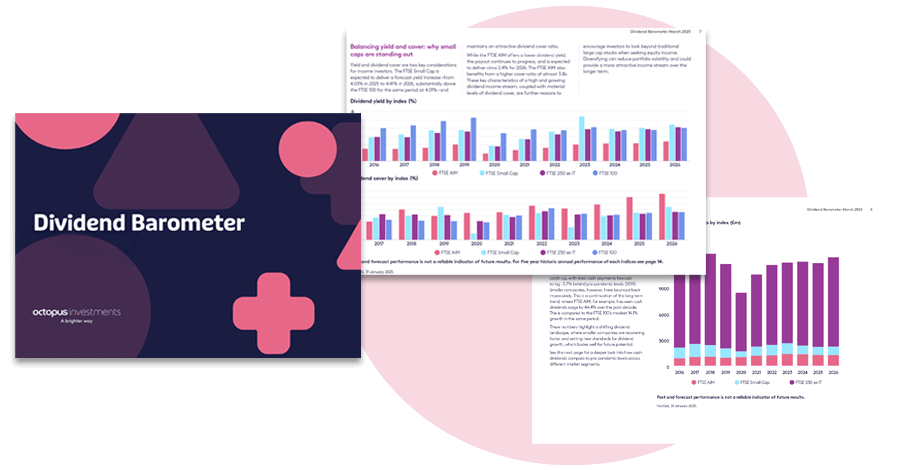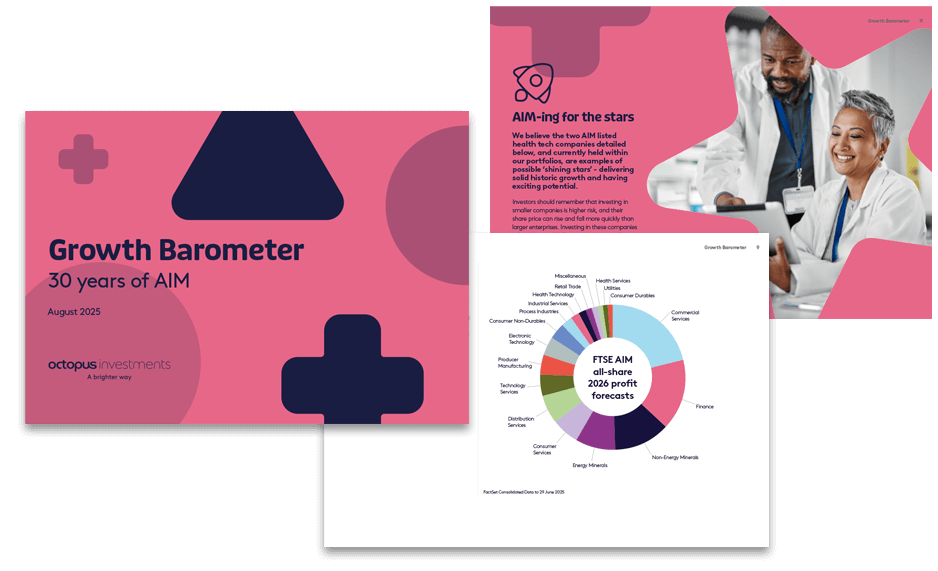The Octopus Live 2025 wrap-up report
The Great Advice Shift: Evolving tax planning across generations
Octopus Live 2025 round up
It’s here! Catch up on the key conversations led by our expert Octopus Live speakers in this brand-new report. From The Great Advice Shift and the Big Pensions Pivot to Celebrating AIM, The Tech Transformation, and The Rise of Private Markets, this year’s event explored the themes that are redefining the advice industry in 2025.
The Great Advice Shift: How today’s financial advisers are adapting to a new era of tax planning
The financial advice profession is undergoing profound change. From the Autumn 2024 Budget including pension reforms to record-breaking inheritance tax receipts, advisers are responding to a rapidly evolving legislation landscape and shifting client needs. Demographic shifts, an ageing workforce, and industry consolidation are also reshaping the profession. This seismic transformation is why we framed the event as ‘The Great Advice Shift.’
Nick Maidment, Head of Retail Sales at Octopus Investments, hosted the opening session of the day with Jessica Tivey, Chartered Financial Planner and Co-Founder of Ivy Sterling, and Paul Feeney, CEO of Shackleton. Together, they explored how advisers are adapting, the opportunities created by legislative change, and the practical strategies they are using to support clients in tax and estate planning.

Autumn 2024 Budget continues to drive earlier planning and broader client conversations
The panel opened by reflecting on how last year’s Budget has influenced adviser-client conversations, particularly in light of upcoming IHT changes on pensions from April 2027.
Jessica Tivey explained how this is shaping client behaviour: “We’ve seen more business around estate planning, as the IHT net has definitely been widened. There is a real need to start these conversations earlier. Whether clients act immediately is another matter, but they want a plan that can withstand change.” She noted that the prospect of inclusion of IHT on unused pensions post April 2027 is prompting more clients to proactively explore estate planning, creating both urgency and opportunity for advisers to engage across a broader client base.
Paul Feeney added further perspective on the underlying client sentiment, noting, “The Budget has reset the emotional contract between government and people, and it’s led many to think a bit outside the box.” This shift has also been reflected in behaviour, with Paul noting that pension withdrawals have notably been on the rise.
Planning for the wealth transfer
With trillions expected to transfer across generations in the coming decades, holistic family planning is becoming essential. The panel discussed the importance of framing wealth planning as a family conversation rather than focusing solely on individual clients. This includes looking both down to the next generation and up to understand the wider family context, ensuring that adult children are aware of their role and expectations within the family plan.
Blended families, second marriages, and other modern family structures add complexity, making clear communication and transparency critical to avoid surprises. Furthermore, advisers are seeing younger generations proactively looking to understand about inheritance and financial planning, often sparked by information they encounter online. The panel emphasised the importance of the advisers’ role in guiding families through these conversations, filtering out misinformation, and helping them develop flexible, well-structured plans that work for everyone involved.

Navigating legislative change and uncertainty
Consumer Duty was identified as the most significant regulatory change for advice firms in recent years. While it represents a positive shift, encouraging advisers to focus more closely on client outcomes and transparency, it has posed practical challenges, particularly for smaller independent firms that lack dedicated teams or resources to manage the additional requirements.
Jessica emphasised that while navigating Consumer Duty can be complex, the bigger source of upheaval for both advisers and clients comes from political uncertainty. Changes in taxation, pension policy, and inheritance rules create a climate of unpredictability, which can unsettle clients and complicate planning decisions.
The session concluded with both advisers underlining the importance of resilient and flexible planning. Paul noted that scenario planning allows advisers to prepare for a range of outcomes: “The key is to ensure that clients’ plans can adapt to change. While nothing is ever guaranteed, the core financial objectives remain protected”.
The Great Advice Shift in numbers
Source: Advice 2025 survey, Dynamic Planner, June 2025
Big pensions pivot: Rethinking the order of estate planning
From 6 April 2027, pensions will be included within the estate for inheritance tax (IHT), marking a significant shift in estate planning that is already reshaping how advisers guide their clients.
To unpack the implications of applying IHT to pensions, and to explore alternative strategies for preserving long-term, intergenerational wealth, we brought together a panel of experts from Technical Connection, Just Group, and our own in-house tax specialist.
The big question on everyone’s mind: “Are pensions as we know it dead?”
Toyin Oyeneyin, Tax Product Specialist at Octopus Investments added, “In terms of IHT planning, yes.” adding “The order of estate planning has, in many ways, been flipped on its head – from “touch pensions last” to “touch pensions first.”
Sean Osborne of Just Group elaborated, “Pensions weren’t originally designed as IHT shelters. It’s only in the past decade that they’ve increasingly been used in this way. These new rules simply return pensions to their original purpose to support people in retirement and later life.”
Claire Trott from Technical Connections noted “For broader retirement planning, they remain absolutely vital. What’s changing is how we use them.”
The case for starting holistic estate planning earlier
A key theme echoed by the panel was that the upcoming changes are a textbook example of why advisers must take a more holistic approach to estate planning – looking beyond traditional solutions to a wider range of investment structures with tax benefits, across the accumulation and decumulation stages of client investment journey such as ISAs, Venture Capital Trusts and Business Relief.
The panel stressed the importance of starting holistic planning as early as possible. “Starting the conversation earlier gives advisers and clients more time, flexibility and control – all of which are essential in today’s increasingly complex tax environment”, explains Toyin. This is resulting in advisers starting to see clients press for guidance sooner, often in their 50s rather than their 70s, as the new rules accelerate demand for planning conversations.
The panel was in full agreement with Sean and Claire stating that advisers are already adapting. This has led to a noticeable rise in annuity sales and whole of life policy uptake throughout 2025, alongside increased conversations around gifting through excess income, extracting pension tax-free cash, and leveraging other tax wrappers such as Business Relief. As Claire neatly summarised, “The more wrappers you build into a client’s financial plan, the more flexibility you have when unexpected change occurs. Making full use of every option creates opportunity to demonstrate the real value of robust advice.”

What is Business Relief?
Investments that qualify for Business Relief provide relief from inheritance tax and can help investors pass on more to loved ones.
The core takeaway?
Ultimately, legislative change is creating both complexity and opportunity. And importantly, no single solution is enough. Advisers who take a proactive and well-rounded approach to estate planning are better placed to demonstrate long-term value and strengthen client relationships over time.
A growing need for professional connections
Another key shift highlighted by the panel is the increasing importance of building a strong network of professional connections. As tax rules become more complex and clients needs more nuanced, advisers are recognising the value of leaning on trusted experts to deliver long-term value to their clients.
As Toyin points out, “Advisers can’t be experts in everything so there will be an increasing need to lean on specialist support from partners who can help you navigate the evolving tax landscape.”
Accountants, lawyers, and technical specialists are all becoming vital allies for advisers seeking to deliver joined-up solutions. Given the speed and scale of policy change, professional partnerships are now seen less as optional and more as an essential part of an adviser’s toolkit.
The big pensions pivot in numbers
1 Source: Inheritance Tax liabilities statistics: commentary – GOV.UK
30 years of AIM: “The most successful growth market in the world”
With the Alternative Investment Market (AIM) market celebrating its 30th anniversary this year, this felt like a timely moment to take stock, providing a chance to look back at three decades of achievement while also considering the challenges facing this pivotal growth market today. With nearly three decades of AIM experience himself, Richard Power, Head of the Octopus Quoted Funds team, explored the successes and lessons of AIM’s past, the current investment opportunity, and the steps needed to revitalise the market for its next chapter.
When AIM was launched in 1995, it was part of a wave of European junior markets, including France’s Nouveau Marché and Germany’s Neuer Markt. While many of these markets have since disappeared, AIM endured. Its success reflects a combination of the UK’s entrepreneurial spirit, consistent government recognition, and targeted tax incentives that channelled growth capital into ambitious businesses – providing the follow-on funding and support that other markets struggled to deliver. Over the past 30 years, AIM has supported more than 4,000 companies in raising over £136 billion1.
“As we see the sentiment towards the UK improve, we believe this progress will be reflected in share prices offering investors the potential for significant upside from today’s depressed market levels.“
– Richard Power, Head of Octopus Quoted Companies, Octopus Investments
Fuelling growth across a diverse range of sectors
Since its inception, AIM has supported an extraordinarily diverse range of businesses, from long-standing family-run companies like James Latham, to university spin-outs commercialising world-class research, to healthcare and technology innovators shaping the industries of the future. Many of these businesses have gone on to the FTSE 250 or FTSE 100, while others continue to thrive on AIM as substantial enterprises in their own right.
AIM’s enduring strength also comes from the consistency of follow-on capital it provides. Many companies return to raise additional funds as they scale, making AIM an enduring source of patient growth finance that fills gaps left by venture capital and private equity. This combination of capital accessibility, market support, and sector diversity has helped AIM remain Europe’s most resilient growth market over three decades.
AIM today and the opportunity ahead
In recent years, liquidity flows out of UK-based funds have negatively impacted AIM and its share prices. However, the market continues to host a large number of fantastic companies that are showing strong signs of growth, building up a significant store of value that will be attractive to investors as soon as market sentiment turns. While structural challenges such as rising costs of being publicly listed and upcoming changes to Business Relief are worth noting, the underlying performance of AIM companies remains robust.
Looking ahead, with patient capital, strong company fundamentals, and the right policy framework, we believe AIM is well-positioned for recovery and long-term growth. It remains a resilient market, full of scale-up potential, and a vital engine for the UK economy.
The Alternative Investment Market in numbers
Forecast performance is not a reliable indicator of future results.
1 Celebrating 30 Years of AIM, LSE, 31 December 2024
3 FactSet Estimates/Octopus Investments, July 2025
Reclaiming time for what matters: How tech can enhance the adviser’s value proposition
With technology advancing at pace and AI now firmly part of the mainstream conversation, financial advice stands on the cusp of profound change. To unpack what this transformation really means for firms and clients, Kristy Barr, Co-Head of Retail for Octopus Investments, hosted a panel featuring Ruth Handcock OBE (CEO, Octopus Money), Helena Wardle (Founder and CEO, Money Means) and David Ferguson (Executive Chair, Seccl). Together, they explored the scale of the opportunity, the barriers that remain, and the steps advice firms can take today to future-proof their businesses.
At the outset, each panellist framed what the true impact of technology has been through a different lens. Ruth highlighted the power of technology to enhance client journeys and evidence consumer outcomes more clearly than ever before. Helena urged firms to think of AI, not as a tool but as a “new kind of labour” that can take on repetitive processes and free up adviser’s time to focus on client relationships. Meanwhile, David emphasised the commercial upside, from reducing cost to serve and friction, and the need to control your firm’s own data. Together, these opening reflections underscored both the client and business impact of technology and set the stage for a wide-ranging discussion on the future of advice.
What is the size of the prize for advice firms who are openly embracing tech transformation?
The gains from getting technology right go far beyond incremental improvements. By streamlining client journeys, evidencing outcomes, reducing cost to serve, and opening the door to underserved segments, technology is enabling firms to grow and broaden access to advice.
As Ruth Handcock OBE explained, “The impact technology can have on customers is incredible. Firstly, a great digital interface allows customers to better understand the outcomes they can achieve and creates a real attachment between the customer and your business brand. Secondly, it makes consumer duty compliance and outcome tracking so much easier. With great technology you can not only show how much better off every customer is after advice, but you can also track their sentiment too.”
Ruth also highlighted that technology can democratise advice, helping firms reach more diverse clients earlier in their wealth journey while unlocking new commercial opportunities.
Yet despite this upside, many firms have struggled to make meaningful progress. Legacy systems, regulatory complexity, and cultural resistance remain sticking points. As David Ferguson put it, “The human side of financial planning just keeps getting better but outdated infrastructure and legacy technology are really starting to undermine this and compromise the overall client experience.” Firms that fail to modernise risk falling behind both in client outcomes and in commercial competitiveness.
AI: “A new kind of labour”
Beyond the buzz, AI is already reshaping the industry in practical ways by automating processes, improving efficiency, and enabling advisers to spend more time with clients. Helena Wardle reframed AI as “a new kind of labour” – not just software, but a digital colleague that can take on repetitive tasks and free up advisers to focus on higher-value work. She emphasised the cultural shift this requires, noting, “We do not hire anyone who does not use AI. It should not be feared. Instead, it is a tool to make your job more effective, more enjoyable, and to allow you to spend time on the work that really matters: serving your clients.”
The panel agreed that embracing AI with curiosity, experimenting with its capabilities, and understanding its limitations are all essential steps for firms looking to modernise. Those that integrate AI thoughtfully can enhance client experiences, reduce operational friction, and unlock new growth opportunities.

Building a resilient tech stack
For adviser firms in 2025, certain foundations are now non-negotiable. Chief among them is clean, well-structured data under the firm’s control. As David highlighted, data leakage remains a huge issue in the sector, with value often lost through fragmented systems and poor data management. Without full control of their data, even the most advanced tech stack cannot deliver its potential.
Making tech work for financial advisers
The panel closed with a note of reassurance and encouragement: technology is not about replacing advisers but empowering them. By stripping away the repetitive tasks, tech creates space for more meaningful client conversations. The message was clear: approach new tools with curiosity, experiment boldly, and focus on the opportunities for more human advice, not less.
“Technology and AI will make your job more joyful, but only if you embrace it with curiosity and a willingness to learn.” – Ruth Handcock OBE
The advice tech transformation in numbers:
Source: Financial Planning Growth Index, Saltus Partnership Programme and L.E.K. Consulting, April 2025
Private markets: A new era for retail investments
In recent years, private markets have been capturing wider industry attention and headlines, increasingly being recognised for the strategic role they could play in unlocking UK growth due to their potential to deliver outsized returns over the long-term. We were therefore excited to host an insightful panel session exploring their importance both as an asset class and their growing relevance for suitable retail investors. The discussion was led by Tim Dickens, Head Investment Specialist at Octopus Investments, with insightful contributions from Sarah Adams, Co-Director of Policy of the British Private Equity and Venture Capital Association (BVCA) and Richard Court, Head of EIS and VCTs at Octopus.
As Sarah highlighted, “Private markets have grown significantly in recent years, with more companies staying private for longer, indicating a maturation of the market. Private capital now contributes almost £200 billion annually to the UK economy, equating to 7% of GDP. Through private markets, we are backing the most cutting-edge businesses, from deep tech to net zero, helping to rewire the UK economy and support significant job creation.”

What are private markets?
Private markets are investments in companies or assets not listed on public exchanges. They can provide access to high-growth opportunities and diversification but are typically higher risk and less liquid than public markets.
The growing relevance for advisers and retail investors
To kick off the session, the panel discussed why private markets are becoming such a critical part of today’s investment landscape, particularly in recent years marked by heightened volatility. They highlighted the valuable diversification this asset class can offer beyond public equities, and it’s track record of delivering stronger performance than public markets over the long-term.
For suitable retail investors comfortable with high-risk investing, the case for accessing private markets through tax-efficient wrappers such as Enterprise Investment Schemes (EIS) and Venture Capital Trusts (VCT) has also never been stronger. With a rising tax burden and frozen allowances, these structures provide valuable reliefs while also offering diversification from public markets and the potential to capture the superior long-term returns that private investments can deliver. Recent data from the BVCA shows that UK private equity and venture capital funds delivering stronger performance than selected public market indices over the last 10 years1.
Their importance has also been underscored by recent government action, from the Mansion House reforms which aim to channel more private investment from pension funds into scale-up funding gaps for high-growth companies, to the extension of the sunset clause, the legislation underpinning EIS and VCTs, a clear recognition that backing UK private innovation is vital for future economic growth.
An exciting point in time to invest in the next wave of AI-enabled innovation
The panel highlighted that some of the most technologically advanced and high-growth companies are found in private markets rather than public ones. Focusing only on public equities means missing out on exposure to these exciting businesses.
Today, there is a particularly compelling cohort of businesses, many leveraging AI from the ground up, solving global problems and growing at phenomenal rates. AI-enabled solutions are beginning to replace conventional software, and private markets are where investors can access these opportunities before companies go public. For those seeking exposure to the cutting edge of technology, private markets offer a chance to invest in the most exciting companies at an early stage. As Richard Court neatly summarised:
“Where else could you explore AI outside of the Magnificent 7? VCTs give you a chance to access some of the most exciting early-stage tech companies in private markets, with diversified exposure and the added benefit of a 30% income tax relief and tax-free dividends.”
Private markets in numbers
1 Private Capital continues to outperform public markets over the long term, despite a more challenging 2024, The British Private Equity & Venture Capital Association, June 2025
2 Eighty-six percent of private equity firms expect alternative investments to dominate retail portfolios in the next five years, The Apex Group, February 2025
3 Increasing retail client exposure to private capital investing, Deloitte, April 2025
4 2024/2025 VCT fundraising is third highest on record, The Association of Investment Companies, April 2025
Risks to bear in mind
Capital at risk
Unquoted and Smaller Company investments are high-risk. The value of an investment, and any income from it, can fall as well as rise. Investors may not get back the full amount they invest.
Tax relief can’t be guaranteed
Tax treatment depends on individual circumstances and tax rules could change in the future.
Volatility and liquidity
The shares of unquoted and smaller companies can fall or rise in value more than other shares listed on the main market of the London Stock Exchange. They may also be harder to sell.
Qualifying status
Tax reliefs depend the portfolio companies and VCTs maintaining their qualifying status.
Any recommendation should be based on a holistic review of your client’s financial situation, objectives and needs. This communication does not constitute advice on investments, legal matters, taxation or any other matters. Personal opinions may change and should not be seen as advice or recommendation.






